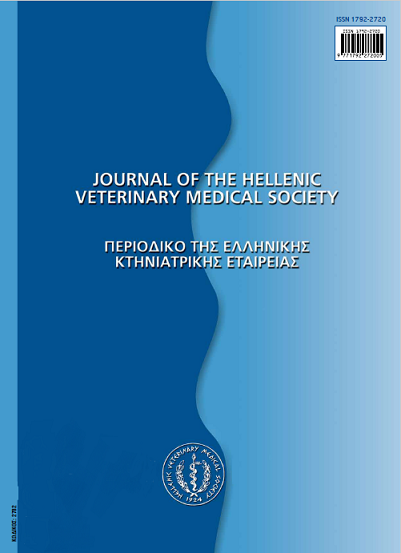Analysis of the PRNP gene polymorphisms in healthy Greek sheep during 2012 – 2016

Abstract
Scrapie is a slowly progressive infectious disease of sheep and goats that causes degeneration of the central nervous system. Scrapie is one of several transmissible spongiform encephalopathies (TSEs), like the bovine spongiform encephalopathy (BSE). In sheep, polymorphisms at codons 136, 154 and 171 of the host gene PRPN that encodes the PrP protein, are known to be closely linked to susceptibility or resistance to natural and experimental classical scrapie. In many countries, but not in Greece, breeding programs have been implemented to increase genetic resistance. This study was supported mainly by the private initiatives of farmers willing to improve their flocks by increasing the resistance to scrapie. Thus, the PrP genotypes (of the three mentioned codons) from 5815 blood samples of clinically healthy rams from 160 healthy flocks during the period 2012 – 2016 were determined. Additionally, 1399 blood samples were genotyped only for the 171 codon. Samples were analyzed by Real Time PCR (TaqMan probes) with specific labeled probes. Our results showed an increased percentage of the two genotypes, ARR/ARR and ARR/ARQ linked with resistance to the disease (27.29% and 34.6%, respectively) and relatively reduced percentage of the genotype ARQ/ARQ (24.23%) which is associated with susceptibility to disease and is the most common genotype in the Greek flocks. This joined effort has resulted in the establishment of an important number of farms with an increased population of genetically resistant rams to classical scrapie.
Article Details
- How to Cite
-
BOUKOUVALA, E., KATHAROPOULOS, E., CHRISTOFORIDOU, S., BABETSA, M., & EKATERINIADOU, L. V. (2018). Analysis of the PRNP gene polymorphisms in healthy Greek sheep during 2012 – 2016. Journal of the Hellenic Veterinary Medical Society, 69(1), 839–846. https://doi.org/10.12681/jhvms.16438
- Issue
- Vol. 69 No. 1 (2018)
- Section
- Research Articles

This work is licensed under a Creative Commons Attribution-NonCommercial 4.0 International License.
Authors who publish with this journal agree to the following terms:
· Authors retain copyright and grant the journal right of first publication with the work simultaneously licensed under a Creative Commons Attribution Non-Commercial License that allows others to share the work with an acknowledgement of the work's authorship and initial publication in this journal.
· Authors are able to enter into separate, additional contractual arrangements for the non-exclusive distribution of the journal's published version of the work (e.g. post it to an institutional repository or publish it in a book), with an acknowledgement of its initial publication in this journal.
· Authors are permitted and encouraged to post their work online (preferably in institutional repositories or on their website) prior to and during the submission process, as it can lead to productive exchanges, as well as earlier and greater citation of published work.


